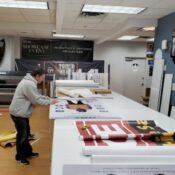/
/
The Future of the Automotive Industry: An Interview with Tim Glockner
There's no doubt the automotive industry is changing, but you don't have to tell Tim Glockner. As the sixth generation co-owner of their family business (along with his two brothers, Mike and Joe), the Glockners have been providing transportation to the residents of Southern Ohio and Northern Kentucky ever since Bernard Glockner emigrated from Germany in 1847. They started with bicycles.
Over the last 160+ years, the Glockner family of dealerships has grown to include a Chevrolet franchise (the oldest continuously owned and operated to date), as well as Honda and Toyota store, multiple auto credit locations, and their most recent acquisition, a Ford dealership.
With such a rich history and the proven success of running multiple car dealerships, I wanted to get Mr. Glockner's insight on running a family business, shifts in the automotive industry, and preparation for the future.
Q. Let’s start with something light. What’s the funniest / craziest thing you’ve ever had happen at one of your dealerships?
A. I sold a new $80,000 Cadillac Escalade to a friend of mine a few years ago. She was very excited to pick it up but couldn’t get here for a couple of days, so I put the Cadi in our drive thru car wash for safe keeping until she arrived.
There is an 84 Lumber store up the hill from our dealership and that night one of their fork trucks had been left in neutral. It came roaring down the hill and crashed into the building, causing our electrical service to explode and burned the Cadi to the ground.
I don’t know what the chances of that happening are, but I’d have a better chance of being elected president. It was crazy. My friend was obviously disappointed but we found her another Escalade and she laughs as she shares the story with other friends.
Q. Was it expected of you to go into the family business?
A. My dad always encouraged me to find a career that I would enjoy even if it wasn’t in the car business -- however, my grandfather would follow that up with, “Don’t let me down Tim, you’ve got to carry on the family business."
Q. What are some of the biggest shifts or trends that you’ve seen in the automotive market? How did you react? Did it always turn out favorably?
A. The internet has obviously changed how people purchase cars. When I started in the business in 1998, the average customer visited 5 dealerships before purchasing a car. Now they consult over 28 websites on average and visit just one store.
I read an article recently that suggested 30% of current customers would complete the entire transaction online if possible, just like shopping on Amazon or Ebay. I can see that increasing rapidly as Gen Y becomes more influential. I suppose someday this will become a reality, where the deal is done electronically from home and the dealership delivers the car to the customer’s house.
We have become a digital dealership. We’ve purchased every tool available to help us predict when a customer is in the market to buy, what their ability is to buy, how and when we should approach them, etc. We have an entire team of 10 people apart from our showroom sales teams who look for opportunities to pull customers ahead in their trade cycle. We leverage technology to be better, smarter and faster. We’ve also failed several times at the BDC initiative and other industry trends, but we feel like we have it dialed in now and we’re on pace to have another record year.
Q. Diesel and electric vehicles are continually on the rise. With the bulk of your business located in rural Ohio, how has this had an effect on your business? Where do you see this moving on a larger scale?
A. We have never been a volume diesel truck group. Even though diesel fuel is at a reasonable price at the pump, we aren’t seeing an increase in diesel truck sales. Electric vehicles have not been popular at all in rural communities like ours. I don’t see that being a long term solution in rural or urban America.
I actually believe fuel cell-hydrogen cars are the future of the automotive industry. We have plenty of water as a natural resource and it gives off zero emissions. The infrastructure is already there with big box stores like Walmart and Kroger who have gas stations in every city. If they would simply replace one of six or eight gasoline pumps with a hydrogen station, that sounds like a much better idea to me.
Q. Self-driving vehicles have been getting a lot of press lately. Do you see these eventually becoming the norm? If so, how soon?
A. I don’t think this is a good idea for several reasons. People enjoy the freedom of driving, the thrill of handling their own little race car. I can’t see taking the human element out of that. I like the safety features that could help people avoid collisions, but I think removing the person from the control of their automobile would be a dangerous proposition.
Q. Do you see any other trends having an impact on the market?
A. Every car company is starting to build vehicles with built-in modems to help the customer, the dealership, and the manufacturer stay connected. In the near future, customers will be able to push a button in their car to diagnose and potentially fix or complete an update over a wireless network without coming to the dealership. That will be very popular with people as we are all too busy to be without our vehicles.
Special thanks to Tim Glockner from Glockner Enterprises for taking the time to share his insight with us!
Have any commentary of you own? Share your thoughts in the comments section below.
Recent Posts
Mudd Advertising
Let’s Retarget and Bring ‘em Back!
Mudd Advertising
Signs That Sell: Boosting Visibility
Mudd Advertising
Paid Search Advertising for Autos: Ignite Your Dealership’s Sales
All Categories
Tags
aia ads
automotive
chevy
ctv
digital marketing
direct mail
direct marketing
display
display ads
dynamic inventory display
email
email marketing
facebook
gbp
google analytics
google my business
google my business inventory
google shopping ads
internet marketing
local seo
MUDDid
mudd id
online marketing
pay per click
performance max
pmax
pop
ppc
radio
retargeting
search engine marketing
search engine optimization
sem
seo
social
social media
social media marketing
traditional marketing
traditional media
ux management
vehicle listing ads
video advertising
video production
vla
web ux




